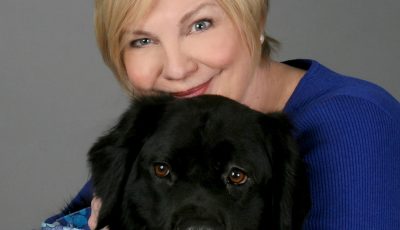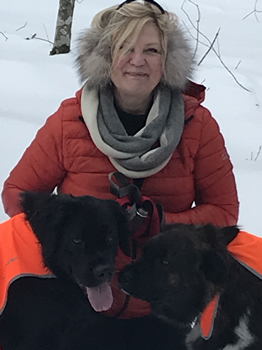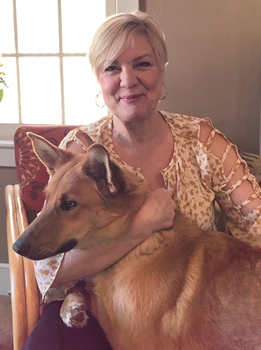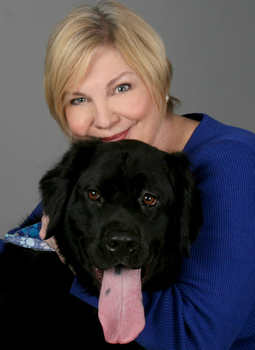

Up Close: Paula Munier
Buzzing with a Love of Books
 By Karen Hugg
By Karen Hugg
Pierre Simon Fournier may have said the aphorism, “After all the basic necessities of life, there is nothing more precious than books,” but Paula Munier has lived it. She works tirelessly in service of the written word and has hung this quote in her office to speak for her passion. Munier is a journalist, agent, author, speaker, and teacher who wears several hats seemingly with ease.
Aspiring writers may know her as the author of the now-classic writing craft book, Plot Perfect. Publishing industry folks may know her as the dealmaker behind such writers as Larry Kay and Kate Flora. And readers may know her as the author of the Mercy Carr mystery series. Regardless of how people know her, Munier knows books—and that’s led to an impressively varied, prolific career.
With her new novel, THE HIDING PLACE, Munier revisits Northshire, Vermont, where Afghan war vet Mercy Carr is at work investigating her grandmother’s disappearance and how it relates to the cold case of Beth Kilgore, who went missing 20 years earlier.
Meanwhile, a dangerous convict has escaped, and Mercy must piece together the clues if she’s ever to find her grandmother again. Fans of previous series installments A Borrowing of Bones and Blind Search will be happy to see handsome game warden Troy Warner return, as well other beloved characters like Patience and Amy, and most of all, sweet dogs Susie Bear and Elvis. And just to keep things interesting, there’s a new four-pawed friend and a mysterious man from the past.
The Big Thrill had a chance to video chat with Paula about THE HIDING PLACE, her creative process, the world of military dogs, her journey as a writer, and how goats make an appearance in her next book.
When we last left off with Mercy Carr, she’d just helped solve the murder of a young woman. Now in THE HIDING PLACE, her grandmother’s home has been attacked, and Patience has gone missing—right when a dangerous criminal has escaped from prison. Where did the idea for the book come from?
Well, my editors always tell me, “Don’t forget about your supporting cast.” When I was writing Blind Search, the second book in the series, they didn’t like the [working] title. I couldn’t even tell you what the title was but it was bad [laughs], so I came up with 100 titles that I could live with. “Blind Search” was one of them because it’s the kind of search that dogs do when they don’t have any object to smell, right? They’re not looking for a particular scent or a particular person, they’re just looking for something out of place. It’s very interesting the way they do it.
My editor came back to me and said, “Okay, the publisher likes Blind Search,” which I really liked so I was happy with that, “but the editorial director really likes THE HIDING PLACE so we’ll call this book Blind Search and the next book we’ll call THE HIDING PLACE.” He also knew that Mercy’s grandfather was a sheriff killed in the line of duty, and he said, “I think this would be great if this [book] was a cold case that had to do with one of her grandfather’s cases.”
That’s what I knew about the book. I knew it was going to be called THE HIDING PLACE and it was going to be a cold case with the grandfather. I’d never written a cold case mystery before, and that kind of worried me because a cold case mystery is triggered by something that happened in the past. And a lot of cold case mysteries … there are flashbacks to that past. And I always warn all of my clients and my writing students against flashbacks, no flashbacks. I thought, how am I going to do this?
I was worried about pulling it off, so I started reading, which is what I do when I don’t know what to do, and I came across Attica Locke. If you haven’t read Attica Locke, she’s totally awesome. She has a lot of cold case mysteries. At least a couple in that Highway 59 series. I thought, Oh, I see how she did this. I could do a sort of mini-version of that. So that was the hardest thing for me. It [my book] was a cold case story and I had to figure out how to write a cold case story.
Yeah, that really is no small task. You have to know why it dead-ended in the first place and what clues could be used to revive it, etc.
Right, exactly. Well, I’m very pleased because this month’s Library Journal just came out, and The HIDING PLACE was given a starred review and Pick of the Month. Which is very exciting. And Dru Ann Love, who writes Dru’s Book Musings—she’s a crime book blogger—says it’s the best book in the series. I was like, “Wow.” I wasn’t convinced I’d pulled it off, but maybe I did.

Munier’s three dogs, Bliss, Blondie, and Bear, on a walk with Munier near the author’s New Hampshire home
The dogs are one of my favorite aspects of these books. Obviously, Elvis and Susie Bear are trained search and rescue and military dogs. And Susie Bear bears a strong resemblance to your dog, Bear. What was the inspiration for putting dogs in the books? Was that something you knew you wanted to do, or was that sort of an impulse?
Well, the way I came to write the series was so ridiculous anyway. I was writing this book called The Writer’s Guide to Beginnings for Writer’s Digest. I was writing this four years ago or something like that. I had all of these great beginnings, all these famous beginnings as examples. But I needed an opening chapter, a whole first chapter, that I could take and put through its paces in terms of showing revisions, using it for exercises, etc. And I couldn’t do that with anybody else’s work, right? So, I thought, I’ll just have to write a chapter.
I had just done this fundraiser for Mission K9 Rescue. That’s an organization that finds military working dogs who are not being well cared for after their service. They rescue them and find forever homes for them. Leo Maloney, who writes thrillers for Kensington, great guy, he did this fundraiser for Mission K9 Rescue. A bunch of us mystery people in New England went and helped him run this fundraiser. We got to meet all these dogs and their handlers. I met law enforcement dogs, and state police and their drug-sniffing dogs. I met soldiers and their bomb-sniffing dogs, I met game wardens and their illegally-procured-fish-smelling dogs. I met all these dogs and all these handlers, and I sort of fell in love with them. Especially the Malinois.
Anyway, a couple months later, I was writing this book, and I needed a chapter and I thought, Well, I’ll just write a fun chapter, and I’ll put in everything I love. I’ll put in a female veteran, and I’ll put in a game warden, I’ll put in Vermont, and I’ll put in a Malinois like the ones I met. We rescued Bear not too long before that, and I thought, I’ll put in a search and rescue dog like Bear. So I wrote this first chapter to go as an example in this writing book. My agent said, “You know, that’s a really great first chapter, you should write that book.” And the next thing I know I have a book deal [laughs]. So it took me a long time to become the mystery writer I always wanted to be, like decades, but then it happened very serendipitously, and it’s been the most fun ever.
That leads me to another question. You have a background as a journalist, so was that the first foray into fiction?
Years ago, I wrote a novel that never sold because you know, we all do, but it was good enough to get me an agent. Then one of the editors who rejected it called me a year later and said, “Look, I really like the way you wrote about teenagers in the book.” This is back in the old old days, the dark ages when there was no such thing as Young Adult. She went to work for Daniel Weiss Associates, who does a lot of those kinds of series for publishers and they were doing a new one for Harper Collins. She said, “Can you write one of these novels for me?” So I did. I wrote this little novel, novella, and that got me published. That was the first fiction I’d ever published.

Munier in the woods near her New Hampshire home with Bear, the black Newfoundland-retriever mix who inspired Susie Bear in the Mercy Carr books, and Bliss, a Great Pyrenees-Australian shepherd mix.
I’d always known I wanted to write. I went from newspapers and magazines to books. I became an acquisitions editor. I did nonfiction. If you’re a nonfiction acquisitions editor, you do a lot of writing and rewriting and ghost writing because a lot of times in nonfiction, you’re hiring the expert, not necessarily the writer. If you’re lucky, the expert can write, but you do a lot of unsung hero writing.
And then I wrote a memoir, a dog memoir, called Fixing Freddie, that came out in 2010. It was a true story about myself, my son, and a very, very bad beagle named Freddie. Freddie was a character. If you’ve ever had a beagle, boy, they’re work. Freddie was an unbelievable dog. He was great, but he was trouble. I wrote that while I belonged to Mystery Writers of America. I was always writing a mystery but never finishing it and never getting anywhere. And then I settled on that first chapter of The Writer’s Guide … so, like I said, it took me a long time. It was a long road with a lot of detours, but I’ve always been in publishing one way or another.
In THE HIDING PLACE, you have this subplot about Elvis’s military handler appearing on Mercy’s doorstep one day and wanting him back. He thought she was putting Elvis in too much chronic danger. I thought it was smart plot-wise. Because by three books into the series, we readers are very attached to Elvis. We don’t want him to leave Mercy. It was suspenseful. What was the idea behind that?
Well, it happens more often than you think with these military working dogs. Especially the army dogs that are literally part of the US Army. They have rank and everything. They’re usually repatriated with their handlers, but sometimes the dogs get adopted by other families. Then later, the handler shows up and says, “I want the dog back.” Then what do you do?
Elvis is not an army dog. Elvis is a defense contractor dog. If it’s an army dog, usually, not always but usually, the dog is well taken care of by somebody. Whether it’s the handler or a family, somebody usually takes care of the dog. But the defense contractor dogs can end up abandoned. When I was doing the Mission K9 Rescue fundraiser, they were telling me how they got this call one day from this guy who said, “Look, I run a kennel and I have 20 working dogs. They’ve been here a year. The defense contractor never paid their bill. They’re through with their service and I’m going to send them to the local kill shelter.” So they raised a lot of money and went and got them. That happens a lot. We don’t want that happening. I knew these stories, and that all figured into it.
I like that you set your books in different seasons rather than different years. That seems a nice simplification because then, as an author, you don’t have to go back and figure out how old people were when or what year they had their baby or what year they were injured. It all takes place in one year. It also reflects the natural setting aspect, like with the Vermont seasonal changes.
That’s what I love about living here. The seasons are so distinct. And they say we have five seasons: all the regular ones, plus mud [laughs]. Mud season’s between winter and spring. And I love the seasons. I love that about New England because it’s like you’re living in a new place every three, four months. It solves the problem of your characters not getting too old too fast. Also, I didn’t have to remember anything about anybody until the cold case book, then I had to do some math.

Munier with Blondie, a Malinois mix who’s much like Elvis in the Mercy Carr novels. All three of Munier’s dogs, along with her cat, Ursula, are rescues.
You mentioned once that you had a copy editor who made a series bible for you. Given the choice, would you do that again if you were starting the series?
Well if I started the series again, I’d make my own. I’d be smarter, I’d be so much smarter about everything [laughs].
Every book in the series presents a different challenge. If you’ve made a decision in book one, now you’re living with it. You can’t forget because readers never forget. That’s the bad side. The good side is in that first book, I just had one line about Mercy’s grandfather—that he died in an arrest gone wrong. That’s it. He was a sheriff who died in an arrest gone wrong and then over time there’s a whole plot about how that happened. So it’s interesting to see this. You’re planting seeds and you don’t even know it when you do it. That’s kind of the fun of it.
You said there will be goats in your next book. Can you give us a little preview?
In the next book, the setting is a destination wedding. Because in Vermont, they have all these resorts and farms and barns and things where people have small destination weddings. And Vermont is a place where there are a lot of goat farms. There are sheep farms, there are lots of farms with barns. And I have a friend who would tell me all about her goats. A lot of people are totally into goats. I thought, what fun are goats? I started looking up all of these goat farms and am going to tour one after I’m vaccinated. So the opening of the book is at a goat farm, and that’s where we find the first victim.
You’re an author and literary agent, and you write a blog and newsletter and are involved with writing organizations and conferences. How do you find the time to do everything? Have you given up TV or what’s your secret?
No, I wish I could give up TV [laughs], but, like everybody else, Netflix is getting us through this pandemic. I mean, I read for a living and there’s nothing I’d rather do. I do read a lot and I teach a lot. I’m very fortunate in that my children are grown. When I was younger and I was a single mom, I had these kids and I had a big job. In that position it’s much harder to write. I didn’t have the psychic space in my head to write fiction … But I like keeping busy now. There is that old saying, “If you want something done, give it to a busy person.”
- Debut Spotlight: Roxana Arama - January 31, 2023
- International Thrills: Claire Douglas - August 1, 2022
- Up Close: Timothy David Mack - March 31, 2022

